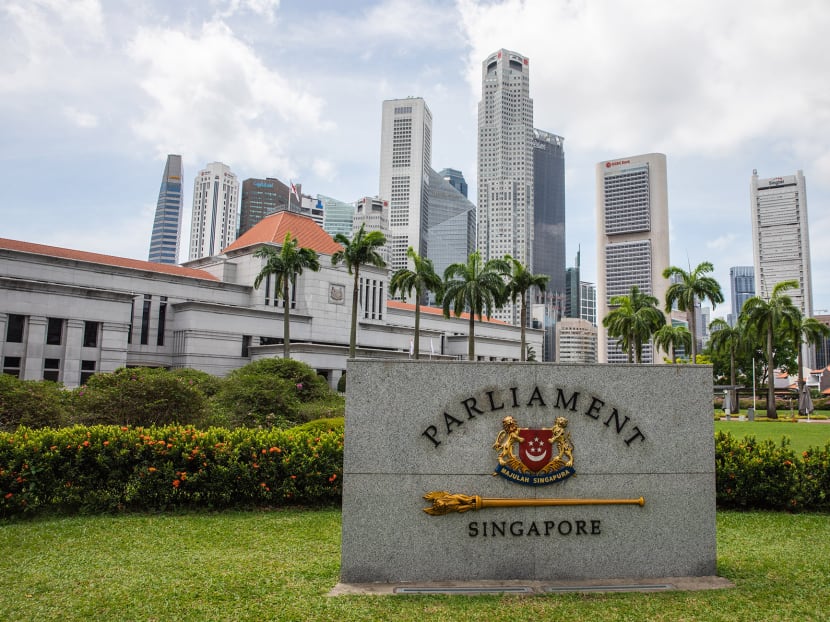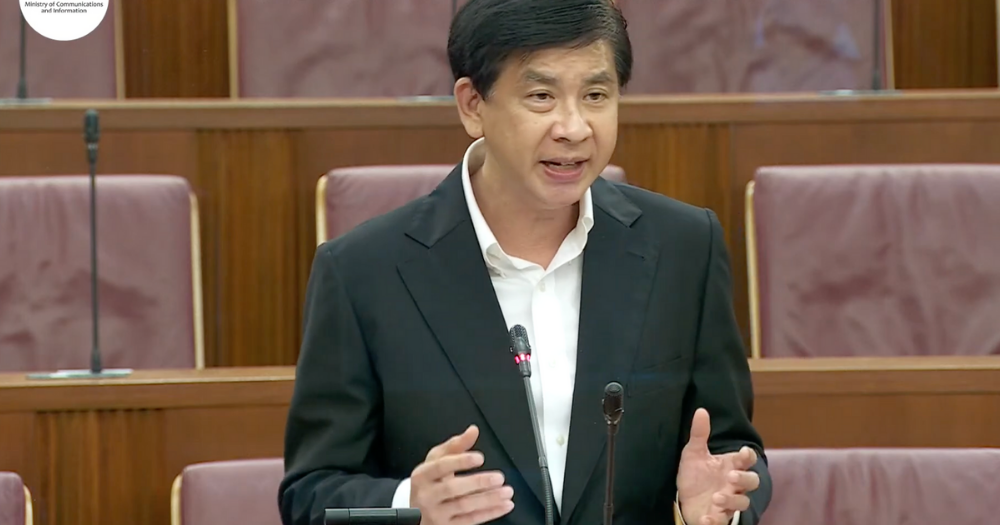His mother's cheebye needs to be tightened every 5 days!

Ili Nadhirah Mansor/TODAYThe second day of the Budget debate on Tuesday (Mar 1) saw 32 Members of Parliament (MPs) from both sides of the aisle as well as Nominated MPs address the House on a broad range of issues.

BY
Updated March 2, 2022
WhatsAppTelegramFacebookTwitterEmailLinkedIn
SINGAPORE — Issuing university degrees with a validity of five years to encourage lifelong learning and giving Singaporeans a "Permanent Growth Dividend" tied to the country's economic success were among the suggestions raised by parliamentarians of the ruling People’s Action Party (PAP) on the second day of the Budget debate.
The nine-hour-long debate on Tuesday (Mar 1) saw 32 Members of Parliament (MPs) from both sides of the aisle as well as Nominated MPs address the House on a broad range of issues.
Topics raised by PAP MPs included resourcing of charities, providing relief for overworked social workers and support for gig economy workers, strengthening Singapore's energy security, helping middle-income families and workers as well as addressing workplace grievances and mental health.
MPs from the Workers’ Party also spoke, with party chair Sylvia Lim raising concerns about Singapore’s ability to innovate due to Singapore's 'tight' rules-abiding culture.
DEGREES WITH A TIME STAMP
Mr Ang Wei Neng, an MP for West Coast Group Representation Constituency (GRC) proposed what he described as a “radical idea” of putting a time stamp on the degrees conferred by Singapore's Institutes of Higher Learning (IHLs).
Graduates would have to attend upgrading courses every five years and failure to do so would result in their degrees lapsing. This means they would not be able to claim the degree as part of their qualification if this happens.
He said his suggestion comes amidst a backdrop of rapid industry changes, where skill sets and real-world experiences could trump university degrees, as he urged universities to evolve in order to stay relevant.
“These days, even without a university degree, skill sets, personal experiences and knowledge can take a person very far,” he said.
Instead of relying on academic qualifications, there is a need for continuous and lifelong learning, and universities “need to take on this role”.
“If we are serious about continuously training and lifelong learning, we have to be radical about transformation. It may not and should not happen overnight. But, we have to start to transform our IHLs,” he said.
WE WIN AND LOSE AS A TEAM
Sembawang GRC MP Mariam Jaafar called on the Government to implement a "Permanent Growth Dividend" tied to the country’s economic growth or budget surplus that is given to citizens.
These payouts could be tiered based on wealth or income and delivered through a mixture of cash and Central Provident Funds (CPF), she suggested.
Ms Jaafar said that this broad-based distribution would “give every Singaporean an additional stake in the nation’s economic progress, reinforcing that we win and lose as a team”.
It would also provide an additional way to enhance financial security and mitigate inequality for those whose fortunes do not reflect the nation’s success.
She noted that Singapore has rolled out one-off payments before, citing the SG Bonus in 2018 and the Growth Dividend in 2011 as examples.
"It may feel moot to even be discussing this in the context of consecutive years of budget deficits, but I hope the (finance) minister might consider this as we move forward," she said.
WHAT LABOUR MPS HAD TO SAY
Mr Desmond Choo, MP for Tampines GRC and an assistant secretary-general at the National Trades Union Congress, urged the Government to consider lowering the minimum age for SkillsFuture.
Singaporeans aged 25 and above can tap their SkillsFuture account to offset fees for a range of reskilling and upskilling courses.
According to Mr Choo, Generation Covid — a moniker referring to young adults coming of age during the pandemic — would benefit from the scheme, especially those who have graduated but find themselves unable to tap growth opportunities due to a mismatch of skills.
He also suggested increasing subsidies for certain SkillsFuture courses that would help young people venture into growth sectors.
Mr Abdul Samad Abdul Wahab, a Nominated MP and veteran union leader, called for greater support for middle-income workers and appealed for the Government to review the income criteria of various support schemes such as kindergarten and childcare subsidies, as well as CPF housing grants.
“Let us also not forget the group of lower-middle-income workers, who are earning slightly more than lower-income individuals, but their families are also struggling with increasing daily expenses, yet they are losing access to government support schemes as they have just fallen short slightly of the income criteria of these support schemes,” he urged.
OVERWORKED SOCIAL WORKERS
MP for Nee Soon GRC Louis Ng suggested that the Government introduce a cap on the number of cases social workers at Family Service Centres (FSCs) take on.
He said that active cases handled by FSCs have skyrocketed during the pandemic, increasing from 17,000 per quarter to 20,000 and cases are getting more complex, resulting in heavy caseloads and exhaustion for social workers.
He shared a quote from a social worker he spoke to: “If you ever wanna know what a social worker’s mind feels like, imagine a browser with 2,857 tabs open. All the time”.
“We need to do more for our social workers, who are just as much at the frontline of this pandemic and are in a tight situation like our healthcare workers,” Mr Ng urged.
RETURN OF LIVE MUSIC
Citing the 2021 TODAY Youth Survey, MP for Ang Mo Kio GRC Nadia Ahmad Samdin noted that 55 per cent of 18 to 35-year-olds felt a dent in their financial prospects as a result of Covid-19.
She said that she knows of youths who have turned to the gig economy as a means of earning an income, but they have faced challenges, specifically musicians and deejays who work at nightlife institutions who are unable to return to their jobs due to Covid-19 restrictions.
Ms Samdin appealed for the Government to consider introducing balanced measures that limit the risks of transmission of performing on stage at food and beverage establishments, so that live music performances can return.
Budget 2022 debate: Degrees with 5-year validity period and 'Permanent Growth Dividend' for citizens among proposals by MPs

Ili Nadhirah Mansor/TODAYThe second day of the Budget debate on Tuesday (Mar 1) saw 32 Members of Parliament (MPs) from both sides of the aisle as well as Nominated MPs address the House on a broad range of issues.
- MPs spent about eight and a half hours debating the Budget in Parliament
- Degrees with a validity of five years and permanent growth dividends were among some of the suggestions raised by the PAP
- Other suggestions include introducing a cap on cases handled by social workers and greater support for middle income
- The government should also consider lowering the minimum age for SkillsFuture, they said

BY
CHARLENE GOH
Published March 2, 2022Updated March 2, 2022
WhatsAppTelegramFacebookTwitterEmailLinkedIn
SINGAPORE — Issuing university degrees with a validity of five years to encourage lifelong learning and giving Singaporeans a "Permanent Growth Dividend" tied to the country's economic success were among the suggestions raised by parliamentarians of the ruling People’s Action Party (PAP) on the second day of the Budget debate.
The nine-hour-long debate on Tuesday (Mar 1) saw 32 Members of Parliament (MPs) from both sides of the aisle as well as Nominated MPs address the House on a broad range of issues.
Topics raised by PAP MPs included resourcing of charities, providing relief for overworked social workers and support for gig economy workers, strengthening Singapore's energy security, helping middle-income families and workers as well as addressing workplace grievances and mental health.
MPs from the Workers’ Party also spoke, with party chair Sylvia Lim raising concerns about Singapore’s ability to innovate due to Singapore's 'tight' rules-abiding culture.
DEGREES WITH A TIME STAMP
READ ALSO
WP disagrees with GST hike, will object to Budget 2022: Pritam Singh
Mr Ang Wei Neng, an MP for West Coast Group Representation Constituency (GRC) proposed what he described as a “radical idea” of putting a time stamp on the degrees conferred by Singapore's Institutes of Higher Learning (IHLs).
Graduates would have to attend upgrading courses every five years and failure to do so would result in their degrees lapsing. This means they would not be able to claim the degree as part of their qualification if this happens.
He said his suggestion comes amidst a backdrop of rapid industry changes, where skill sets and real-world experiences could trump university degrees, as he urged universities to evolve in order to stay relevant.
“These days, even without a university degree, skill sets, personal experiences and knowledge can take a person very far,” he said.
Instead of relying on academic qualifications, there is a need for continuous and lifelong learning, and universities “need to take on this role”.
“If we are serious about continuously training and lifelong learning, we have to be radical about transformation. It may not and should not happen overnight. But, we have to start to transform our IHLs,” he said.
READ ALSO
Budget 2022 debate: MPs want more support for middle-income workers, propose relooking a segment of property tax hike
WE WIN AND LOSE AS A TEAM
Sembawang GRC MP Mariam Jaafar called on the Government to implement a "Permanent Growth Dividend" tied to the country’s economic growth or budget surplus that is given to citizens.
These payouts could be tiered based on wealth or income and delivered through a mixture of cash and Central Provident Funds (CPF), she suggested.
Ms Jaafar said that this broad-based distribution would “give every Singaporean an additional stake in the nation’s economic progress, reinforcing that we win and lose as a team”.
It would also provide an additional way to enhance financial security and mitigate inequality for those whose fortunes do not reflect the nation’s success.
She noted that Singapore has rolled out one-off payments before, citing the SG Bonus in 2018 and the Growth Dividend in 2011 as examples.
READ ALSO
WP's alternatives to GST increase ‘unsustainable’, will burden middle-income earners: Tan See Leng
"It may feel moot to even be discussing this in the context of consecutive years of budget deficits, but I hope the (finance) minister might consider this as we move forward," she said.
WHAT LABOUR MPS HAD TO SAY
Mr Desmond Choo, MP for Tampines GRC and an assistant secretary-general at the National Trades Union Congress, urged the Government to consider lowering the minimum age for SkillsFuture.
Singaporeans aged 25 and above can tap their SkillsFuture account to offset fees for a range of reskilling and upskilling courses.
According to Mr Choo, Generation Covid — a moniker referring to young adults coming of age during the pandemic — would benefit from the scheme, especially those who have graduated but find themselves unable to tap growth opportunities due to a mismatch of skills.
He also suggested increasing subsidies for certain SkillsFuture courses that would help young people venture into growth sectors.
READ ALSO
Singapore's 'tight' rule-abiding culture key to tackling Covid-19, but holds back innovation: Sylvia Lim
Mr Abdul Samad Abdul Wahab, a Nominated MP and veteran union leader, called for greater support for middle-income workers and appealed for the Government to review the income criteria of various support schemes such as kindergarten and childcare subsidies, as well as CPF housing grants.
“Let us also not forget the group of lower-middle-income workers, who are earning slightly more than lower-income individuals, but their families are also struggling with increasing daily expenses, yet they are losing access to government support schemes as they have just fallen short slightly of the income criteria of these support schemes,” he urged.
OVERWORKED SOCIAL WORKERS
MP for Nee Soon GRC Louis Ng suggested that the Government introduce a cap on the number of cases social workers at Family Service Centres (FSCs) take on.
He said that active cases handled by FSCs have skyrocketed during the pandemic, increasing from 17,000 per quarter to 20,000 and cases are getting more complex, resulting in heavy caseloads and exhaustion for social workers.
He shared a quote from a social worker he spoke to: “If you ever wanna know what a social worker’s mind feels like, imagine a browser with 2,857 tabs open. All the time”.
“We need to do more for our social workers, who are just as much at the frontline of this pandemic and are in a tight situation like our healthcare workers,” Mr Ng urged.
RETURN OF LIVE MUSIC
Citing the 2021 TODAY Youth Survey, MP for Ang Mo Kio GRC Nadia Ahmad Samdin noted that 55 per cent of 18 to 35-year-olds felt a dent in their financial prospects as a result of Covid-19.
She said that she knows of youths who have turned to the gig economy as a means of earning an income, but they have faced challenges, specifically musicians and deejays who work at nightlife institutions who are unable to return to their jobs due to Covid-19 restrictions.
Ms Samdin appealed for the Government to consider introducing balanced measures that limit the risks of transmission of performing on stage at food and beverage establishments, so that live music performances can return.



